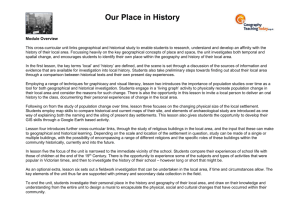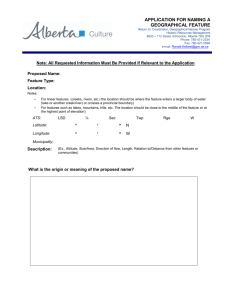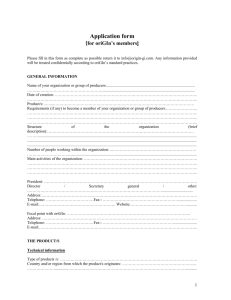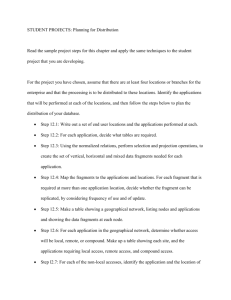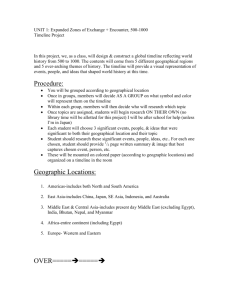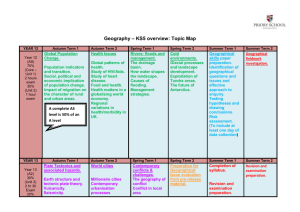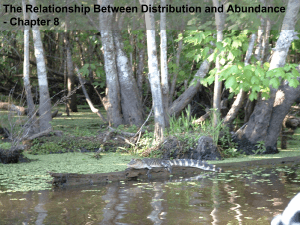Signed: Dated - Coolum Beach Christian College
advertisement
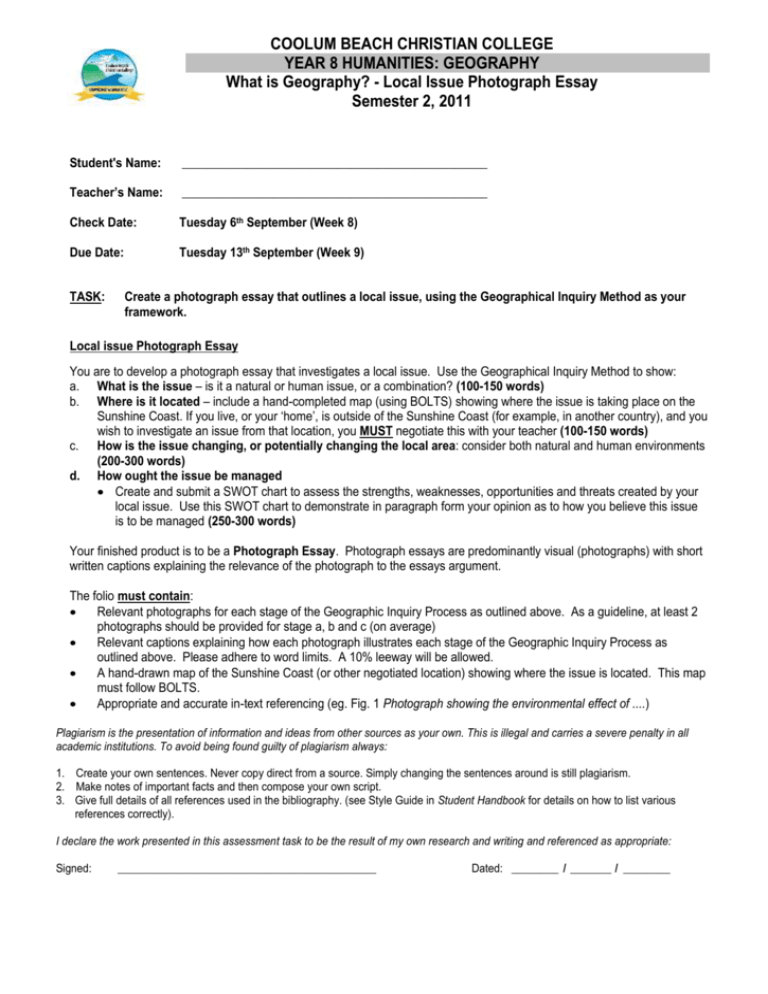
COOLUM BEACH CHRISTIAN COLLEGE YEAR 8 HUMANITIES: GEOGRAPHY What is Geography? - Local Issue Photograph Essay Semester 2, 2011 Student's Name: _______________________________________________ Teacher’s Name: _______________________________________________ Check Date: Tuesday 6th September (Week 8) Due Date: Tuesday 13th September (Week 9) TASK: Create a photograph essay that outlines a local issue, using the Geographical Inquiry Method as your framework. Local issue Photograph Essay You are to develop a photograph essay that investigates a local issue. Use the Geographical Inquiry Method to show: a. What is the issue – is it a natural or human issue, or a combination? (100-150 words) b. Where is it located – include a hand-completed map (using BOLTS) showing where the issue is taking place on the Sunshine Coast. If you live, or your ‘home’, is outside of the Sunshine Coast (for example, in another country), and you wish to investigate an issue from that location, you MUST negotiate this with your teacher (100-150 words) c. How is the issue changing, or potentially changing the local area: consider both natural and human environments (200-300 words) d. How ought the issue be managed Create and submit a SWOT chart to assess the strengths, weaknesses, opportunities and threats created by your local issue. Use this SWOT chart to demonstrate in paragraph form your opinion as to how you believe this issue is to be managed (250-300 words) Your finished product is to be a Photograph Essay. Photograph essays are predominantly visual (photographs) with short written captions explaining the relevance of the photograph to the essays argument. The folio must contain: Relevant photographs for each stage of the Geographic Inquiry Process as outlined above. As a guideline, at least 2 photographs should be provided for stage a, b and c (on average) Relevant captions explaining how each photograph illustrates each stage of the Geographic Inquiry Process as outlined above. Please adhere to word limits. A 10% leeway will be allowed. A hand-drawn map of the Sunshine Coast (or other negotiated location) showing where the issue is located. This map must follow BOLTS. Appropriate and accurate in-text referencing (eg. Fig. 1 Photograph showing the environmental effect of ....) Plagiarism is the presentation of information and ideas from other sources as your own. This is illegal and carries a severe penalty in all academic institutions. To avoid being found guilty of plagiarism always: 1. Create your own sentences. Never copy direct from a source. Simply changing the sentences around is still plagiarism. 2. Make notes of important facts and then compose your own script. 3. Give full details of all references used in the bibliography. (see Style Guide in Student Handbook for details on how to list various references correctly). I declare the work presented in this assessment task to be the result of my own research and writing and referenced as appropriate: Signed: ____________________________________________ Dated: ________ / _______ / ________ CRITERIA Knowledge and Understanding A STANDARD Evaluative Processes Communication Skills B STANDARD Shown an extensive knowledge and understanding of local geographical areas Extensive description of local geographical issue(s) described in a comprehensive manner Demonstrated a very thorough understanding of the task; all components of the task completed Consistently used and explained correct terminology and concepts Geographical information is insightfully related to the evidence provided Analysis and resolution of conflicting needs for completing the task achieved at a very high level The supporting evidence provided is comprehensive and relevant. The supporting geographical account is clearly and logically developed. Displays exceptional understanding of the geographical inquiry process Class time has been used wisely with extensive time management skills present Followed a consistent format for presentation Consistently followed language conventions with appropriate grammar, spelling, sentence and paragraph structure Use of maps, graphs and tables adheres to all geographic conventions, including BOLTS (where appropriate) Photographs are all student’s own work which show an excellent eye for extensive geographic detail Is neatly and clearly annotated Correct, with minimal, or no, errors, in-text referencing (where appropriate) C STANDARD Shown a thorough knowledge and understanding of local geographical areas Thorough description of local geographical issue(s) described in a detailed manner Demonstrated a thorough understanding of the task; all components of the task completed Fairly consistently used correct terminology and concepts Geographical information is related to the evidence provided Analysis and resolution of conflicting needs for completing the task achieved at a high level The supporting evidence provided is relevant. The supporting geographical account is logically developed. Displays a good understanding of the geographical inquiry process Class time has been used well with good time management skills present Followed a consistent format for presentation Followed most language conventions with appropriate grammar, spelling, sentence and paragraph structure Use of maps, graphs and tables adheres to all geographic conventions, including BOLTS (where appropriate) Photographs are all student’s own work which show a good eye for geographic detail Is mostly neatly and clearly annotated Correct, with some errors, in-text referencing (where appropriate) D STANDARD Shown an accurate knowledge and understanding of local geographical areas Accurate description of local geographical issue(s) described in a generally correct manner Mostly demonstrates an understanding of the task; all components of the task completed Mostly used and explained correct terminology Some geographical information is related to the evidence provided Analysis and resolution of conflicting needs for completing the task achieved at a satisfactory level Some relevant evidence is provided in support. The supporting geographical account is organized Displays a moderate understanding of the geographical inquiry process Class time has generally been used well and with time management skills present Generally followed a consistent format for presentation Generally followed language conventions with appropriate grammar, spelling and paragraph structure Use of maps, graphs and tables adheres to the majority of geographic conventions, including BOLTS (where appropriate) Photographs are predominantly student’s own work which show a satisfactory eye for geographic detail Is adequately annotated Generally correct in-text referencing (where appropriate) E STANDARD Shown some knowledge and understanding of local geographical areas Some description of local geographical issue(s) described in a general manner Demonstrated a poor understanding of the task; not all components of the task completed Seldom used and explained correct terminology Occasionally some geographical information is related to the less complex evidence provided Analysis and resolution of conflicting needs for completing the task achieved at a poor level An occasional, explicit issue or concept can be recognised in nonwritten documents. Some of the content and comprehension elements of the task can be accurately completed. A few points of relevant evidence have been provided. Basic decisions can be recognised. Class time has not been used well with few time management skills present Inconsistently followed a consistent format for presentation Followed few language conventions with grammar, spelling, sentence and paragraph structure Use of maps, graphs and tables follows few geographic conventions, including BOLTS (where appropriate) Photographs are predominantly student’s own work which show an some eye for geographic detail Is poorly annotated Incorrect in-text referencing (where appropriate) Shown little knowledge and understanding of local geographical areas Little description of local geographical issue(s) described in a poor manner Demonstrated a very poor understanding of the task; not all components of the task completed Rarely used and explained correct terminology Geographical information is not, or rarely, related to the evidence provided Analysis and resolution of conflicting needs for completing the task achieved at a very poor level Interpretations and explanations of evidence lack relevance and perception. Responses lack relevance when attempting to solve problems. Displays no understanding of the geographical inquiry process Class time has been used badly with little, or no, time management skills present Did not follow a consistent format of presentation Did not follow language conventions Use of maps, graphs and tables do not follow geographic conventions, including BOLTS, are irrelevant, or are blank Few photographs are student’s own work and tend to not show an eye for geographic detail Incorrect, or no, in-text referencing (where appropriate)

